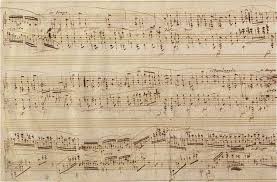
Frederic Chopin didn’t need to write monumental symphonies. His Ballade No. 4 in F minor, Op. 52 reveals a universe of musical expression in just over ten minutes. Written between 1835 and 1842, Chopin’s four harmonically adventurous Ballades for solo piano inspired both Liszt and Brahms. Robert Schumann said that Chopin’s inspiration for the Fourth Ballade was Adam Mickiewicz’s poem, The Three Budrys.
Let’s listen to a spectacular performance of Ballade No. 4 by pianist Krystian Zimerman. The piece evolves from a distinctive five note motive. Does the music go where you expect or does it deliver surprises? Notice the drama Chopin achieves from a single chord or a sudden key change. As full blown Romanticism, this music is all about savoring the expression of the moment. Each harmony and key has emotional meaning, although we would have a hard time describing it in words. Although there is a formal structure at work, it’s easy to hear one episode spinning from another in a musical stream of consciousness.
[button link=”https://itunes.apple.com/us/album/chopin-ballades-barcarolle/id79393525″]Find on iTunes[/button] [button link=”http://www.amazon.com/Chopin-Ballades-Barcarolle-Sharp-Fantasy/dp/B000001G8Q”]Find on Amazon[/button]
[quote][it is] the most exalted, intense and sublimely powerful of all Chopin’s compositions … It is unbelievable that it lasts only twelve minutes, for it contains the experience of a lifetime.[/quote]
-composer and pianist John Ogdon
Did you notice the way the opening seems to come out of nowhere, as if finishing some imaginary, unheard preceding phrase? Here, and throughout the piece, Chopin subtly changes the inner voices in interesting ways. For a moment the music seems to be searching for a way forward (0:30) before finding its five note motive. At times this motive is hidden in inner voices (around 6:04 and in the coda from 10:22 to the end).
Another interesting aspect of the music is the way simplicity leads to increased complexity. At 1:29 we already begin to get ornamental embellishments. At 3:25 there is a competing contrapuntal voice which grows increasingly insistent. By 8:04 embellishment has taken over completely.
In September of 1939, as the Germans marched into Poland, radio stations continuously played Chopin’s music in defiance. Eventually radio was silenced in Poland, replaced with loudspeakers blaring Nazi propaganda, but the story is a reminder of the transcendent spiritual power of music.

Mr. Judd, Thank you for posting this information and recording of one of the most beautiful pieces in the piano repertoire. It was good to hear this performance again. I am performing this piece in two weeks and it seems that I discover new each time I play it. I only hope that I will play it with as much power and passion as Zimmerman.